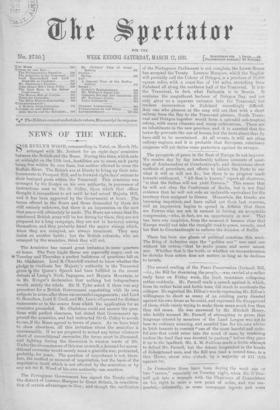The Armistice has caused great irritation in some quarters at
home. The Tory Light Horse are especially angry, and on Tuesday and Thursday a perfect hailstorm of questions fell on Mr. Gladstone. Lord R. Churchill wanted to know whether the pledge to vindicate her Majesty's authority in the Transvaal given ist the Queen's Speech had been fulfilled in the recent defeats at Laing's Neck, Ingagana, and Majuba Mountain, or in Mr. Kruger's declaration that nothing but independence would satisfy the rebels. Sir H. Tyler asked if there was any precedent for a British Government negotiating with its own subjects in arms, after three unsuccessful engagements ; and Lord G. Hamilton, Lord E. Cecil, and Mr. Lewis all pressed for distinct statements as to the source from which the application for an armistice proceeded. Mr. Gladstone could not answer the ques- tions with perfect clearness, but stated that Government ap- proved the armistice, and had instructed Sir G. Colley to accede to ono, if the Boers agreed to terms of peace. As we have tried to show elsewhere, all this irritation about the armistice is unreasonable. If we are prepared to accept any terms whatever short of unconditional surrender, the terms must be discussed, and fighting during the discussion is wanton waste of life. Under the circumstances of this war or revolt, a demand for uncon- ditional surrender would merely mean a guerrilla war, protracted, probably, for years. The question of importance is not, there- fore, the method or moment of negotiation, but the basis of the negotiation itself, which is not affected by the armistice, or by any act Sir E. Wood of his own authority can sanction.


































